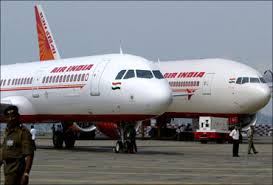
New Delhi, Mar 22: Air India Express has been asked by the Delhi State Consumer Commission to pay Rs 88,000 to a passenger for failing to provide him with an alternative after his flight to Dubai was cancelled.
The state commission held the airline liable for the damages, saying that it has to realise the inconvenience a passenger suffers on cancellation of the flight and it is their duty to provide alternative arrangements in such cases.
The commission's observations came while upholding the decision of a district forum here which had allowed the plea of the aggrieved passenger and had directed Air India Express to pay him Rs 88,000, including compensation and the extra amount he had to pay for a ticket on another airline.
"Once tickets have been booked by a consumer for flight, it is the Airlines' duty to provide the requisite transport unless they are inhibited by reasons beyond their control. The Airline has to realise the inconvenience a passenger suffers on cancellation of the flight and it becomes the duty of the airline to provide alternative arrangements which the airline in this case failed to do. Therefore, they had to be held liable for damages and the district consumer forum was justified in the award made by it," a bench presided by Justice Barkat Ali Zaidi said.
The airline in its appeal had challenged the district forum's decision, saying the flight was cancelled due to a technical problem.
The commission, however, dismissed its appeal and said the airline had not elaborated what the technical problem was.
The district forum's order had been passed on a complaint by Delhi resident Sunil Goyal, who had stated that his flight to Dubai from Delhi via Abu Dhabi scheduled to take off on May 22, 2005 was cancelled and claimed no reason was given for the same.
He had also alleged that as no alternative was provided to him by Air India Express, he had to buy a more expensive ticket on another airline.
Normal 0 false false false EN-GB X-NONE X-NONE
/* Style Definitions */
table.MsoNormalTable
{mso-style-name:"Table Normal";
mso-tstyle-rowband-size:0;
mso-tstyle-colband-size:0;
mso-style-noshow:yes;
mso-style-priority:99;
mso-style-parent:"";
mso-padding-alt:0in 5.4pt 0in 5.4pt;
mso-para-margin-top:0in;
mso-para-margin-right:0in;
mso-para-margin-bottom:10.0pt;
mso-para-margin-left:0in;
line-height:115%;
mso-pagination:widow-orphan;
font-size:11.0pt;
font-family:"Calibri","sans-serif";
mso-ascii-font-family:Calibri;
mso-ascii-theme-font:minor-latin;
mso-hansi-font-family:Calibri;
mso-hansi-theme-font:minor-latin;
mso-bidi-font-family:"Times New Roman";
mso-bidi-theme-font:minor-bidi;
mso-fareast-language:EN-US;}





Comments
Add new comment